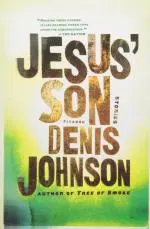Say you're a literary writer. You've worked with famous types, attended plenty of conferences, maybe you even have an MFA. Chances are, there are a few things you don't know that writers of sci-fi (and speculative fiction in general) know that you don't.
This is not to denigrate the state of creative writing education (you can get that here, if you wish) or to suggest that what you have learned so far is anything less than profound. It's simply to say that when I waded out into the great, wide, windy gulf between my formal education and "the genres," I was struck by the degree to which speculative fiction writers—many of whom do not have formal educations in writing—seemed to have answers to questions I'd struggled with for years.
Such as, for instance?
1. Workshop Shorthand
There are certain tropes you get used to hearing when you're a veteran of workshops: "on the nose" dialogue, for example (dialogue that says too clearly what the characters mean) and "throat-clearing" (that eminently expendable beginning of a story which is not the beginning of the story at all).
But spec fic writers have their own lexicon, some of which I encountered in a document called the Turkey City Lexicon, named after the Austin writers’ workshop that was a cradle of cyberpunk in the late 80s (one of my fellow facilitators distributed this document to everyone associated with her workshops at Norwescon 37 in Seattle last year).
Consider Brenda Starr dialogue, which refers to an exchange between characters that is so lacking in visual information about the scene, it resembles that old staple of the Sunday morning funnies in which dialogue balloons were often seen emerging from the Manhattan skyline.
Or this gem: not simultaneous—"Putting his key in the door, he leapt up the stairs and got his revolver out of the bureau." Not too friggin' likely, right?
One of my favorites is Burly Detective syndrome, which referrs to unnecessary verbal contortions aimed at avoiding repetion. This term was apparently derived from the writers of the Mike Shayne pulp-detective series, who showed an odd reluctance to use Shayne’s proper name, preferring to employ such groaners as "the burly detective" or "the red-headed sleuth."
As an editor, I have spent untold hours of my life explaining to aspiring authors why visuals are absolutely essential to dialogue that works; why sequential actions can't be written as simultaneous; and why sometimes, repetition really is okay. But if I were in an SF workshop, I'd simply drop one of these useful bits of shorthand and move on.
2. Drafting and Revising
You hear it over and over again: All writing is rewriting. And that's true, to a certain extent. But if you have no first draft, you have nothing to revise.
There are fine literary writers who produce one or two masterpieces over the course of their careers (Ralph Ellison and Harper Lee, for example). Folks who labor—perhaps in and around the cracks of their busy academic schedule—at the same sentence for hours or even days at a time.
But writers of SF generally don't have that luxury. First, because they generally do not have academic jobs, and second because they are actually trying to get paid to write.
So if you don't want to spend your entire life laboring over just a few precious books, consider the advice of Lev Grossman, the New York Times bestselling author of The Magician King, on drafting (as excerpted from Wonderbook by Jeffrey Vandermeer):
When you're writing fresh copy, it's tempting to stop and go back over your pages right away, while they're still all glittery and new and you're still under the spell of your initial inspiration. I won't tell you not to do that, but a) it's a time suck, and b) its usefulness is limited...Think of it this way: You're on a Jet Ski, and if you slow down you'll sink into the shark-infested waters you're trying to skim over.
He goes on to note that the longer he waits to revise, the better his revisions are. And by better, he means more efficient; Grossman improves his prose more quickly and with less effort by simply waiting longer to revise.
Why does waiting make such a diference? He says:
It's one of the curious properites of good prose that while hardly anybody can write it, almost everybody can recognize it...You want to engage those naturally deadly accurate readerly instincts that everyone has—instead of those limp, unreliable writerly ones—and put them to work for you.
Putting the work away, basically, removes your familiarity with it.
The lesson here—perhaps the most useful one I have learned about writing, in school or out—is to draft quickly, revising as little as possible, then put the work away and revise something you haven't seen in a while. It sounds simple, but you'd be amazed how much time it saves.
3. Strangeness
Different people read for different reasons, but to reproduce the mundane circumstances of their everyday lives is generally not one of them. There are literary writers who understand this and those who don't—hence the preponderance of divorce novels, teen angst novels, dealing-with-an-aging parent novels (etc., etc., etc.) that do little more than take us where we've already been and tell us what we already know.
 Those who write speculative fiction generally understand that while what we know and understand has its charms, the reason most of us read is to experience something fundamentally new (I would say that there is almost something approaching a nuclear arms race of novelty in spec fic—which, of course, comes with its own hazards).
Those who write speculative fiction generally understand that while what we know and understand has its charms, the reason most of us read is to experience something fundamentally new (I would say that there is almost something approaching a nuclear arms race of novelty in spec fic—which, of course, comes with its own hazards).
Those working in a realist mode can't rely on alien sex based on the odd mating habits of anglerfish, say, the way Vonda M. McIntyre does in "Little Faces" for novelty, nor can they summon up a djinn of smokeless, subtle fire, the way G. Willow Wilson does in Alif the Unseen. But they can make use of the many ways we encounter strangeness and novelty in life and cultivate the art of recreating it on the page.
A literary master of this is Denis Johnson, the author most well known for his linked story collection Jesus' Son (as well as his novel Tree of Smoke, which won the National Book Award). Through the use of liminal states (e.g., dreams, drunkeness, sleep deprivation, madness), subcultures unfamiliar to the protagonist (the gay scene in Providence, for example, or the northern California pot mafia), and truly startling language (his post-apocalyptic novel Fiskadoro nearly invents its own), Johnson creates as much strangeness in his realist work as any writer of spec-fic does in his.
I could go on here—about the many ways that strangeness appears in Jess Walter's Hollywood, Rachel Kushner's 1970s New York, and virtually every story ever written by the hand of George Saunders. Suffice to say, anyone interested in holding their reader's attention should take note.
4. Know Your Genre

Writers of SF are, first and foremost, voracious readers, and they're often very savvy about the genres they work in. Whereas most literary writers, I've found, have only the barest conception of where their work fits in the current publishing milieu (in part because many of them have been studying classic literature, but that's another post).
Of course, the divisions are a little clearer within genre fiction—to an almost laughable degree (hence paranormal YA romance, alternative historical fantasy, "furry" fiction, and virtually everything ending in the suffix -punk). But despite the fact that the differences between various types of literary fiction are more subtle, it behooves anyone serious about publishing to get savvy about them.
Is your novel a family saga told in a rotating POV? A returning-Iraq-war-veteran novel? An academic mystery with overtones of the fantastic? Chances are, there are numerous examples of that sort of thing being published right now. The more knowledgable you are about the imaginative space you're working in, the less likely you are to reinvent the wheel, and the more likely you are to get a handle on who your readers are and what they like (you'll also get a leg up on pitching to agents and publishers).
5. Quantity is Key
Did you pour your heart out into one shining novel, then give up when you failed to get it published? This has been the fate of far too many of the literary writers I met in grad school. It's as if, having stolen this time away from Real Life to work on their masterpiece—with the help of famous writers!—they figure if their first novel doesn't get published, it's time to throw in the towel, because this is the best thing they'll ever write.
The exact opposite is generally true. Your work when you're a student is just that, student work. Also, if you had a number of different mentors, chances are, you tried to please a number of different people with completely different sensibilities, so that book is likely a patchwork of different approaches.
I'm not saying throw that book away and start over. But acknowledge the fact, the way spec-fic writers tend to, that actually writing a book is the only way to learn how to write a book. Besides, everyone knows that in SF, you need to have a series, whether you get annointed by the gods who dwell atop the magic mountain at Tor or publish it your own damn self.
Add to this the fact that it generally takes archeological ages for any book to find its way to publication, and ask yourself, why would I not move on to writing another book? Letting a languishing first novel spell the end of your career is not only shortsighted, it is a bit, if I may say it, precious. Get back on that horse, princess.
Of course, there are probably some things that literary writers know that spec-fic writers generally don't. But that will have to be someone else's post.
In the meantime, whatever your genre, whatever your ambitions, may you (and your writing) live long and prosper.

About the author
An author, editor, and educator, Susan DeFreitas’s creative work has appeared in the Writer’s Chronicle, Story Magazine, the Huffington Post, Daily Science Fiction, and Southwestern American Literature, along with many other journals and anthologies. She is the author of the novel Hot Season, which won a Gold IPPY Award for Best Fiction of the Mountain West, and holds an MFA from Pacific University. She divides her time between Santa Fe, New Mexico, and Portland, Oregon, and has served as a freelance editor and book coach since 2010.







